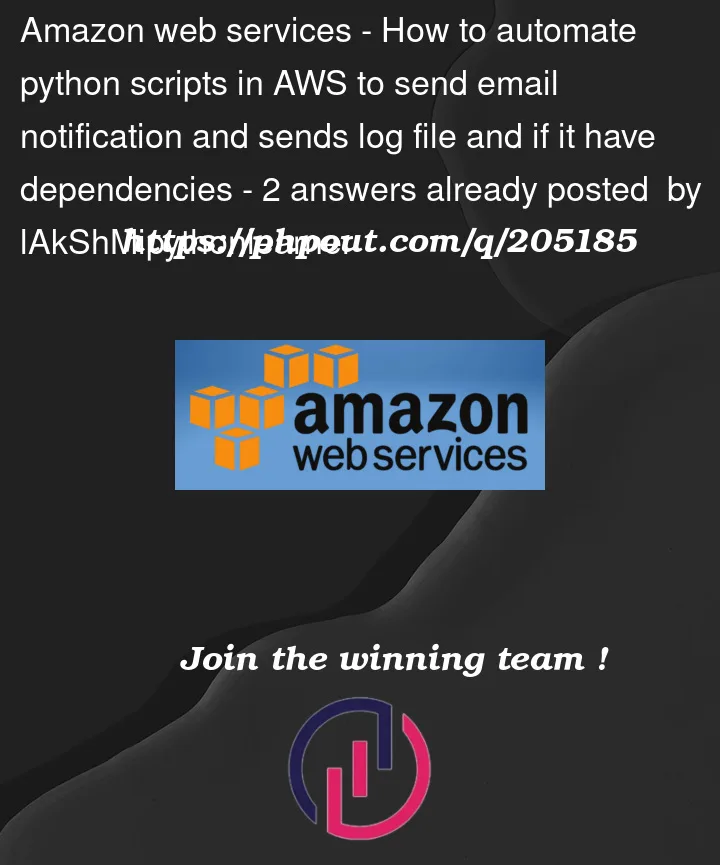I have python scripts
script1.py
script2.py
script3.py
script4.py
from my local machine when I ran those scripts it creates log files so I will send those log files to email manually
first script is creates one log file when i ran and 2nd scripts creates one log file
in 2nd script we have logic which creates JSON file using DBEAVER Database data and upload that JSON file in HUBSPOT API using token and API info
now i want to automate those scripts in AWS, I have python code how can I deploy and automate scripts which needs to send log file and email
second python script is having some logic which connect to Dbeaver Database extract users data and convert in to json and upload that json file in HUBSPOT api
In aws how it crates that json file and how it upload those json file every week
can anyone please help me on this i’m very new to AWS
here is the sample code example
import***
logger = logging.getLogger(__name__)
logger.setLevel(logging.DEBUG)
class LOAD:
def DB_conn(self):
self.connection = psycopg2.connect(
host= '', database= "!!", user= "@@",password= "**",port = "#",)
fh = logging.FileHandler(filename)
fh.setFormatter(f)
logger.addHandler(fh)
def Data(self):
try:
conn = self.DB_conn()
query= 'select ******'
cursor = self.connection.cursor()
cursor.execute(query)
records = cursor.fetchall()
number_rows = f"Total number of rows in table: {cursor.rowcount}n"
logger.info(number_rows)
--------------------
------------------
logger.info('converting dict to json datan')
now = datetime.datetime.now()
filename = now.strftime('User_data_file_%Y-%m-%d--%H-%M-%S.json')
with open(filename, 'w+') as f:
json.dump(json_stri, f,indent = 4,default=str)
logger.info('JSON File successfully Created!!!n')
except Exception as e:
print("n--- ERROR OCCURED ---nn",e,"nn--- QUITTING TASK ---n")
logger.error(f'FAILED TO CREATE JSONn {e} n')
def chunk_list(list_to_chunk, number_of_list_items):
"""Yield successive chunk_size-sized chunks from list."""
for i in range(0, len(list_to_chunk), number_of_list_items):
yield list_to_chunk[i:i + number_of_list_items]
try:
url = 'https://api.hubapi.com/contacts/v1/contact/batch'
headers = {
'Authorization': "Bearer p*****-bfa4-",
'Accept': 'application/json',
'Content-Type': 'application/json'
}
with open(filename,'r') as run:
json_data = json.load(run)
r = requests.post(
url,
data=json.dumps(json_data),
headers=headers,
verify=False,
timeout=(10, 15),
stream=True
)
if r.status_code == '200':
logger.info("File uploaded successfully")
except Exception as e:
logger.error(f'FAILED TO LOAD JSON FIlen ERROR:> {e} n')
logger.error(f'ERROR OCCURED----nn ERROR:> {e} nn--- QUITTING TASK --- n')
if __name__=='__main__':
BATCH=LOAD()
BATCH.Data()
so this is the logic of second script, can anyone please suggest ideas




2
Answers
Firstly if your tasks take no longer than 15 minutes and require 10GBs of memory consider moving those code parts to lambda functions. If your tasks take longer than that you can consider AWS Batch/EC2/ECS where you can handle long running tasks.
For automation part you can take a look at EventBridge. In there you can create synchronous (cron-based) or asynchronous (event-based) triggers to start your workflow.
Finally if you have more than one lambda function and you want to orchestrate them, take a look at Step Functions, which is relatively easy to use.
My solution consists of two parts:
Explanation:
I hope that helps.